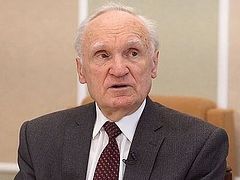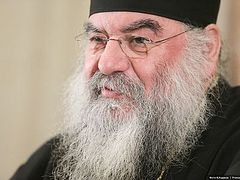The Orthodox Church ascribes enormous significance to time as the instrument of our salvation. Therefore the Church continually prays: “To live the time of our lives in peace, and repose in repentance, let us ask of the Lord.” How important it is that we should live the rest of our days in “peace and repentance”!
But in what kind of peace? The “peace” with which our relationship to Christ is bound. This is not just any peace, with no wars or cataclysms, nor is it a certain peaceful state in the soul. Here the Person of Jesus Christ Himself is named with the word “peace”. The apostle speaks of this: For He is our peace (Eph. 2:14). Thus, “in peace” means dedicating the rest of the time of our lives to Jesus Christ. How? In repentance—for it is not at all our merits and achievements that defend us before God is, but only our repentance. This is because—and this is an indubitable fact—there are no perfect, sinless people.
I would like to ask once again: What is it that justifies us before God? It is not our “perfection”, or “sinlessness”, since no perfect or sinless people exist; nor is it our having never made any mistakes, since neither are there any people who never make mistakes. Then what is left for us to do? Our justification is in our repentance of our sins, of our apostasy from God, that we are all spiritually damaged, that even our human nature itself is damaged—our nature is changed, perverted, its original state is lost; that the passions—those evil tyrants—and our sins changed in us the image and likeness of God as He created us in paradise to the point of being unrecognizable. But despite all of this, we still have boldness before the Lord Jesus Christ; for the Lord created all things for the sake of our salvation—it was His good will to take on flesh, to be baptized, to be born of the Virgin. None of these acts of the Lord were accidental and they all have deep meaning; they were all directed towards man’s salvation. The Lord took each of His steps for the sake of mankind’s salvation. Knowing this, we have boldness before the boundless love of God. And the aim of Christ’s coming to earth is to bring lost and perishing mankind back to Himself, so that we would “acquire” ourselves anew.
The mystery of the Holy Trinity is revealed in the great feast of the Baptism of the Lord; we hymn this in the troparion for Theophany: “The mystery of the Trinity was made manifest…” How is this expressed? “The voice of the Father bore witness unto Thee…” that is, the voice of God the Father bore witness to the Son, “and the Spirit in the form of a dove”—the Spirit was in the form of a dove (the Holy Spirit was not a dove, of course, but in the form of a dove)—and the Son of God, Jesus Christ, baptized in the Jordan. This is a very important point: God the Father gave manifest testimony: This is my beloved Son, in whom I am well pleased; hear ye him (Matt. 17:5); and then Jesus Christ began His saving preaching of the Gospel.
There exists a false opinion, especially among the heretics, that Christ was anointed as the Messiah at the moment of His baptism from the Father. This is an error, because Christ was perfect God and perfect Man from the moment of His conception in the womb of the Mother of God. The Gospels tell us about this. When the Theotokos conceived in her womb and came to visit Elizabeth the mother of St. John the Baptist, Elizabeth said, And whence is this to me, that the mother of my Lord should come to me? (Lk. 1:43). Do you see? The Most Holy Theotokos was still only carrying the Infant in her womb, yet Elizabeth called her the Mother of her Lord by the movement of the Holy Spirit; and not only her Lord, but also the Lord of the Prophet and Forerunner John, and the Lord of all people and the whole world. This means that at the moment of conception, before Baptism, Jesus Christ was perfect God and perfect Man.
By His Baptism the Lord sanctified such an important element as water, and by His Baptism He showed us the saving path—through receiving Baptism…
As Holy Scripture further shows us, after Baptism Christ was taken by the Spirit to the desert, to begin the ascetic labor of fasting. By this He showed us the spiritual path of Christian ascetic labor. When we say that the Lord fasted, we mean that He did not take any food or drink at all. There in the desert, the apostate from God, the devil, approached Him and tried to tempt Him thrice with the main passions and temptations—those three giants, the fore-parents of all the passions: vainglory, the passion for pleasure, and love of money.
The passion for pleasure consisted in the devil’s tempting Christ to command that the stones be turned into bread; after all, Christ had just finished a forty-day fast. Love of money was expressed in the devil’s tempting Christ with wealth, showing Him in the twinkling of an eye all kingdoms and their glory, saying, “All this will I give to you if you will bow down to me.” Vainglory consisted in the devil’s tempting Christ to jump from the pinnacle of the temple, and by remaining unharmed to show His divine omnipotence. Our Lord Jesus Christ put the devil to shame, rejecting all his attacks and temptations. Then the angels came to the Lord and ministered to Him as the God-man.
Thus the Lord Jesus Christ, having been victorious in the desert over the man-hating devil, goes to the world to preach the Gospel, saying, Repent, for the Kingdom of Heaven is at hand (Matt. 4:17). The Lord began preaching the Gospel with the words, “repent”. In Greek, the word “repentance”—μετάνοια—means “correction of mind”; the root of this word is νόος, or “mind”, and μετα, or “change”. The Lord calls us to change our mind, our way of thinking, and to acquire, according to the apostle, another way of thinking: But we have the mind of Christ (1 Cor. 2:16). This “other” mind is nothing other than the mind of Christ and the mind of the Church. As we have already said, the Lord created all of this to show us that we need the sacrament of Baptism and the sacrament of confession, which He established. We also need to war daily with the passions, with “diabolical suggestions”, be they vainglory, love of pleasure, love of money, or any of the other passions. By saying, “Repent!” He shows us that the feeling of repentance should be based upon our ascetic labor; it should “dissolve” all our actions. If we want to enter the Kingdom of Heaven, we simply must learn the feeling of repentance.
The Lord came to the world not just with the aim of making good people out of us, because we can also become good people without Christ—at least up to a certain degree. Christ appeared to this world so that by His Love He might make us children of God, as the apostle John the Theologian writes: But as many as received him, to them gave he power to become the sons of God (Jn. 1:12). And what does it mean to “become children of God”? It means that the Lord gave us the possibility to again become the “image and likeness of God”, to become what we were created according to His design. He gave us the possibility to again acquire the Father’s love and the whole beauty and dignity of human nature, which He by His mercy and love restored through His divine Providence. We can clearly see this divine Providence and design if we follow the whole yearly cycle of divine services and participate in all the major feasts established by the Church.




